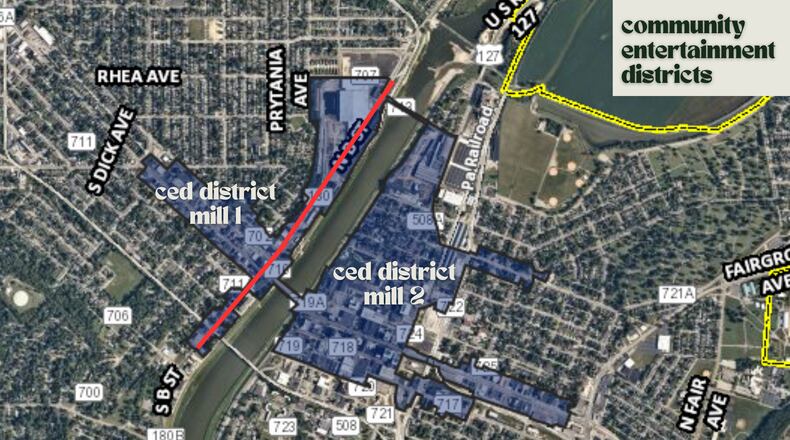If approved, businesses still would have to garner the support of their local option issue of voters within their precinct.
This process, though, will only be in two defined districts in and around the city’s urban core. State law only allows this voter-approved signature bypass process for local options within a Community Entertainment District (CED).
The process of creating a CED is complex and nuanced, but the primary two components are a $50 million minimum investment (it can be a single project or multiple projects) and an existing property owner petitioning for the creation of the district. The city’s two CEDs, which are divided by B Street, are because of the Spooky Nook development, which is bisected by North B Street. The two CEDs are also divided by B Street.
Mallory Greenham, Hamilton’s assistant to the city manager, who helps the city’s small businesses said the local option election process could be difficult for small business owners, which may have few as two people. She said the city has fielded questions as to why some businesses aren’t open on Sundays. Basically, they don’t have the D6 permit.
Brad Reed, co-owner of the soon-to-open Nicc and Norm’s Sidecar Bar on South B Street with Nicc Meece, said this would give them “a big return on Sundays.” The Sidecar Bar, which would be Meece and Reed’s second establishment, is expected to be open later this year at 221 S. B St. and within the CED.
“It’s quite a large chunk of money for sales if we did have that opportunity to have those Sunday sales,” said Reed, adding the local option process for many business owners is “a very difficult thing.” Their first establishment, Nicc and Norm’s Tavern on Millville Avenue, is closed on Sundays because they don’t have a Sunday sales license.
For those businesses serving alcohol on Sundays, it typically means voters had already approved the local option request to serve on that day at that address.
To go from “dry” to “wet” on Sundays is a multi-step process. Business owners ― many of who have limited time and resources ― need to pull voter registrations in a precinct from the county elections office. Then they would go door-to-door collecting signatures of registered voters on a petition (the number varies by precinct). Once collected, the business owner submits petitions to the elections office. They’d likely need more signatures than the minimum because, many times, signatures are not valid for various reasons.
After petitions are submitted, the county elections board evaluates the documents for certification consideration. If the petition is certified, business owners would have to run a campaign asking voters in the precinct to support their issue. If they’re rejected, they have to wait until the next election.
“Sometimes we’re talking about a restaurant that had two people,” Greenham said on a business’s efforts to get a local option on a ballot. “So you can imagine why some of our businesses have not found the time or the resources to make this happen, or they’ve attempted and have been unsuccessful.”
Tyler McCleary, director of restaurant options at Tano Hospitality Group, said they have a D6 license at Tano Bistro on Riverfront Plaza in downtown Hamilton. He said it’s “a complete game changer.”
“What Sundays have become, especially with the Spooky Nook crowds, it’s the third busiest day after Friday and Saturday,” he said, which about 20% of those sales being alcohol sales. “We’ve also hired more people, both front of house and back house. In the last two months, we’ve brought on at least eight more people, which is significant for our business.”
That’s what Reed said they want to see at Nicc and Norm’s Sidecar Bar.
“I think it would be a great addition to the area, whether it’s bringing new jobs because we’d need more bartenders, more people for our kitchen,” he said. “I think it would just be a great way to add value to coming out in Hamilton. It’s another destination. I don’t want to have people go outside of Hamilton when we can have them here in Hamilton, spending money and being happy.”
The two CEDs include areas like German Village, the Central Business District, Heaton Avenue, Maple Avenue, East High Street and the Main Street business district.
Those businesses outside the designated area are not eligible for the signature bypass process. However, Greenham said they could create another CED if they have another collective $50 million investment in an area and a property owner requests its creation.
Otherwise, the business owner would have to go the local option route.
Hamilton’s two CEDs also mimic the existing Designated Outdoor Refreshment Area (DORA), which allows off-premises consumption of alcohol. The DORA boundaries would overlay the boundaries of any new CED that is established.
If City Council approves this legislation at its June 14 meeting, it would be considered by the Butler County Board of Elections for certification on the November ballot, where all Hamilton voters ― not just voters within the two CEDs ― will vote on the issue.
About the Author


